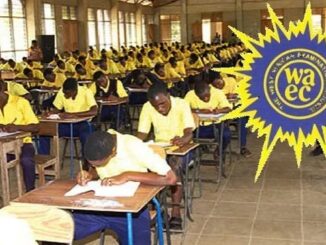Welcome to “Naijaclass Academy“ For Waec 2025 Literature Prose And Objective Answer – How you can get our sure question and solution before exam time.
Waec 2025 Literature Prose And Objective Answer

Thursday, 22nd May 2025
Literature-In-English 2 (Prose), 2:00pm – 3:15pm
Literature-In-English 1 (Objective), 3:15pm – 4:15pm
——————————
LITERATURE OBJECTIVE
1-10: BBDBDBDBDD
11-20: ABADDBDADD
21-30: BBCCADBBBD
31-40: CABBBCBADA
41-50: BACCDDDACB
===========================================
COMPLETED THEORY Q1, 2,3,4,5,6,7
NUMBER ONE
(1)
In Second Class Citizen, Buchi Emecheta makes use of allusion to deepen the meaning of her story and connect it to wider themes. One important way she does this is by alluding to colonialism. Adah’s struggles in England reflect the lingering effects of British colonial rule in Nigeria. Her experiences as a Nigerian woman in a foreign land show how colonial history continues to affect individuals, even after independence.
Another strong allusion is to the Bible. Emecheta includes biblical references to show how religion influences Adah’s early beliefs about life, suffering, and duty. These allusions help explain how Adah tolerates so much hardship, believing that endurance and patience are signs of virtue. Over time, her view changes, showing her personal growth and a shift in how she sees the world.
Emecheta also uses allusion when describing the Western education system. Adah admires the idea of going to school and becoming educated, a value introduced during British colonial rule. The way she connects success and education is an indirect reference to how colonial systems promoted English schooling as the only path to progress. Through Adah’s eyes, we see both the benefits and the limitations of this belief.
Lastly, the novel alludes to feminist struggles and ideas, especially through Adah’s fight for her independence and dignity. While these references are not always direct, they reflect broader movements for women’s rights. Adah’s journey mirrors the struggle many women face in a society that tries to silence them. These allusions give the novel a deeper meaning and place Adah’s personal story in the context of larger historical and social issues.
WAEC LITERATURE
NUMBER TWO
(2)
In Second Class Citizen, Adah’s experience of motherhood is full of both love and struggle. She deeply values her children and sees them as a reason to keep going. Even when things are hard, she works tirelessly to provide for them. Her children give her strength and purpose, especially in a foreign land where she faces many challenges.
Adah’s journey as a mother is also marked by sacrifice. She often puts her children’s needs before her own. She takes up difficult jobs and endures poor living conditions just to make sure her children have food, shelter, and a chance at a better life. Even when her husband, Francis, refuses to support the family properly, Adah continues to carry the burden alone.
Motherhood also brings pain and emotional stress for Adah. She faces the sorrow of losing a child, and the constant worry about their safety and well-being. In a harsh and sometimes uncaring society, she struggles with poverty and loneliness, yet still manages to protect and nurture her children with whatever little she has.
Adah’s motherhood is a source of empowerment. While it brings many challenges, it also pushes her to grow stronger. She becomes more determined to live a life of dignity and to give her children better chances than she had. Through motherhood, Adah finds courage, identity, and a sense of independence, making it one of the most powerful parts of her story.
WAEC LITERATURE
NUMBER THREE
(3)
Pao’s treatment of Nii in Unexpected Joy at Dawn is interesting because it shows the struggle between personal ambition and human compassion. Pao, who is Nii’s close friend and fellow worker, becomes distant and selfish when faced with opportunities to rise in his job. He chooses his own survival and advancement over friendship. This change is particularly seen when Pao uses his connections at the Ghana Commercial Bank to secure a better position, leaving Nii behind to face the challenges alone. It is striking how quickly loyalty can be replaced by self-interest when one sees the chance to gain more in life.
Another interesting aspect is how Pao justifies his betrayal. Rather than admitting he has abandoned Nii, he uses clever words and excuses to make his actions seem normal or even necessary. He pretends he has no power to help Nii when in reality, he has access to people and information that could assist. This shows the human tendency to protect oneself even when it causes harm to someone else. Pao becomes a symbol of how society pushes people to act selfishly in difficult times.
Also, Pao’s attitude toward Nii reflects the social pressure that surrounds both of them. Living in Ghana during a period of political and economic instability, many people are forced to act out of fear and desperation. Pao’s betrayal can be seen as part of a larger system where people are encouraged to think only of their own well-being. This gives his actions a deeper meaning. It’s not just about friendship, but about how harsh realities can turn close allies into strangers.
Finally, what makes Pao’s treatment of Nii most painful is the way it affects Nii emotionally. Nii trusted Pao and believed in their bond. When Pao chooses to ignore his struggles, it deepens Nii’s feelings of isolation and helplessness. The betrayal from someone so close hurts more than anything else. It shows how people who are already suffering can be pushed even further when those they trust choose comfort over loyalty. Pao’s actions, while understandable in a tough world, remind us how easily trust can be broken when personal gain becomes more important than friendship.
WAEC LITERATURE
NUMBER FOUR
(4)
Irony is an important literary device used in Unexpected Joy at Dawn to highlight social injustice, failed expectations, and the clash between personal identity and state policies. One striking example of irony in the novel is the title “Unexpected Joy at Dawn”. The title suggests happiness or celebration, yet the actual experiences of the characters, especially Mama Orojo and Nii Tackie, are far from joyful. Instead of a joyful reunion between long-separated siblings, they are met with a series of setbacks, including political hostility, economic struggles, and personal disappointments. The title contrasts sharply with the painful journey they undergo, and this unexpected sorrow becomes the ironic twist.
Another instance of irony can be seen in the treatment of people who are forced to leave Ghana due to the “Ghana Must Go” policy. The policy is meant to improve the economy and protect national interests by expelling foreigners. Ironically, those targeted, many of whom have lived in Ghana for decades and contributed significantly to the economy, are suddenly branded as threats. Nii Tackie, a Ghanaian by birth, is ironically forced to flee to Nigeria, a country his ancestors had left behind, just to escape suspicion and persecution. His attempt to seek safety in what is supposed to be a brotherly African country becomes a journey full of danger and rejection, showing the bitter irony of African unity failing in times of need.
There is also situational irony in Mama Orojo’s experiences as a successful businesswoman. She believes that her wealth and social status will make it easy to reconnect with her brother and offer him a better life. However, despite her efforts, she finds herself blocked by bureaucracy, corruption, and misunderstanding. Her attempts to help are met with suspicion, and her religious faith and charity work, though genuine, are seen as means to manipulate or gain influence. The irony here lies in the gap between her intentions and the way others perceive her. The very values she lives by, faith, family, and service, are constantly questioned by the harsh reality of the society around her.
Lastly, the novel presents a deep irony in the idea of home. Nii Tackie initially thinks of Ghana as home, but he is made to feel like an outsider. When he goes to Nigeria to search for his roots, he is again treated as a foreigner. The search for belonging becomes a source of alienation. He ends up caught between two identities, neither fully Ghanaian nor fully Nigerian. The irony is that in a story about reconnecting and rediscovering one’s roots, the main character loses his sense of identity and security. Instead of finding comfort and peace, he finds instability and betrayal in both countries that should have welcomed him.
WAEC LITERATURE
NUMBER FIVE
(5)
In Invisible Man, the narrator’s time at Liberty Paints is one of the most revealing episodes in the novel. The factory is famous for its white paint, particularly the “Optic White” brand, which symbolizes the dominant culture’s effort to cover up or erase Black identity. The narrator is assigned to work in the paint mixing room under a man named Kimbro. He is told to add a few drops of a black chemical into a base of white paint, a strange contradiction that reveals the hidden presence and necessity of Blackness even in a society that claims to value only whiteness. This mixing process reflects the hypocrisy of a world that denies Black identity while relying on it at the same time.
The narrator’s experiences with Mr. Brockway, the old Black man working in the basement, further expose the complex structure of power and race. Brockway is fiercely loyal to the company and proud of his secret knowledge of the paint-making process. However, he is also suspicious and hostile toward the narrator, seeing him as a threat. This tension shows how oppression can divide people who are in similar positions. Brockway’s fear of losing his place leads to a fight that causes an explosion in the factory, symbolizing how such internal conflicts and exploitation can lead to destruction.
After the explosion, the narrator is taken to the factory hospital, where he is subjected to electric shock treatments that severely affect his memory and thinking. This moment represents a loss of identity and an attempt to erase who he is. The doctors treat him like an object, not a person, showing the inhumanity he faces. The shock therapy can also be seen as a symbol of how society forces people into conformity by breaking down their sense of self. The narrator begins to question his understanding of the world and starts to become more aware of the forces trying to control him.
Liberty Paints serves as a powerful symbol in the story. The name suggests freedom, but in reality, it represents a system that hides the truth and enforces racial control. The factory claims to produce perfect white paint, but the process depends on adding something black. The narrator’s time there teaches him that beneath the surface of American ideals are contradictions and lies. This experience becomes a turning point in his journey toward self-discovery and understanding the invisible forces shaping his life.
================================================
6)
The clash between Ras the Exhorter and Tod Clifton is a moment charged with ideological tension and explosive emotion in Invisible Man. Ras, a West Indian nationalist, and Clifton, a charismatic Brotherhood member, represent two different visions of Black liberation.
Ras believes in radical Black pride and separation—he sees white society as irredeemable and believes Black people must resist by forming their own systems. Clifton, on the other hand, is more strategic and politically moderate. But by the time the fight happens, even Clifton has become disillusioned, having left the Brotherhood and turned to selling Sambo dolls—a bitter symbol of racial stereotype.
Their fight is not just physical—it’s philosophical. Ras cannot tolerate what he sees as Clifton’s betrayal of the Black cause. Clifton sees Ras as too rigid, too extreme. The narrator watches, helpless and disturbed, as the confrontation erupts. Eventually, Clifton is killed—not in this fight, but shortly after by a white policeman—bringing the tragic irony full circle.
This conflict highlights how internal divisions can weaken collective progress. Ras and Clifton both want justice, but their paths are incompatible. The fight shows how racism not only oppresses from outside but also poisons relationships within the community.
=================================
7)
When Heathcliff returned to Wuthering Heights after years of absence, he was no longer the poor orphan boy who had once played on the moors with Catherine. He had transformed—rich, brooding, and with a heart hardened by betrayal. His return was like the violent wind that swept over the hills, stirring emotions that had long been buried, especially in Catherine.
Catherine had already married Edgar Linton—a man who was gentle, refined, and everything Heathcliff was not. But her heart had never truly left Heathcliff. So when he reappeared, something inside her ignited. Suddenly, the life she had built with Edgar began to feel like a cage. She loved Heathcliff with a fierce, wild love that was beyond reason, and Edgar could sense this pull. His household, once peaceful, became filled with tension and bitterness.
Heathcliff, meanwhile, did not come back to beg or plead. He came with a vengeance, using charm and manipulation to wedge himself between Edgar and Catherine. The more Edgar tried to shield his wife from Heathcliff’s influence, the more Catherine felt stifled. Her health began to decline, her emotions turned into chaos, and the marriage slowly deteriorated.
Heathcliff’s return did not just break the Linton marriage; it shattered Catherine’s mind and spirit. Caught between the husband she respected and the wild love she could not let go, she spiraled into madness. In the end, Heathcliff’s return turned what could have been a peaceful life into a tragic tale of unfulfilled love, broken vows, and eternal longing.
=============
(8)
Wuthering Heights and Thrushcross Grange are not just settings—they are characters in their own right, reflecting the temperaments and destinies of the people who live there. The wild, stormy, and isolated Wuthering Heights stands in sharp contrast to the calm, orderly, and cultured Thrushcross Grange.
Wuthering Heights is a place of raw emotion. It is harsh, wind-battered, and almost primal. It reflects Heathcliff’s brooding spirit, Catherine’s wild passion, and the roughness of Hindley’s rule. There is little peace in the Heights—just as there is little peace in the hearts of those who inhabit it. It is a house of storms—both literal and emotional.
Thrushcross Grange, by contrast, is the image of civilization. It is refined, beautiful, and carefully managed. Edgar and Isabella Linton represent the gentility of the Grange. Yet, this civility comes at a cost—it often suppresses deep feeling. Catherine finds the Grange stifling and longs for the wild freedom of the Heights.
The two places symbolize two opposing worlds: nature versus nurture, emotion versus reason, passion versus order. And as the story unfolds, we see how the characters are torn between these worlds, sometimes belonging to neither completely. By the end of the novel, only when the younger generation—Hareton and young Catherine—unites can peace come, blending the best of both worlds.
============
How to get Waec 2025 Literature Prose And Objective Answer before the exam?
==================
It is important to note that Naijaclass.com is the only website that has the above listed 2025 Waec Expo Daily Subscription Package. However, any website who copy any of the packages listed above will be reported for content theft and have their site removed from Google and other search engines.
==================





Be the first to comment